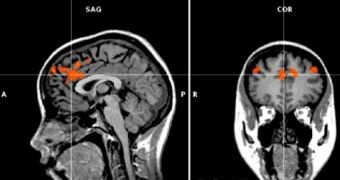Using a medical imaging technique called functional Magnetic Resonance Imaging (fMRI), researchers at the University of Iowa, led by neuroscientist William Hedgcock, have found that self-control is a resource of the human brain that can be depleted.
The way this works is that a certain situation or scenario may deplete our self-control to such an extent that we may not be able to control ourselves once we are faced with the same situation all over again.
What separates Hedgcock's research from others on the same topic is that it uses fMRI to show the exact changes that go on in the human brain when self-control is depleted. The image above shows what the brain of a person with no more self-control left looks like.
The anterior cingulate cortex (ACC), a region of the brain that is responsible for helping us select between multiple choices based on their desirability, was found to fire with equal intensity when a self-control-depleting task was performed multiple times.

 14 DAY TRIAL //
14 DAY TRIAL //